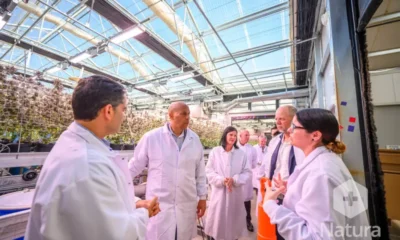Connect with us
Published
2 years agoon

In a continued exploration of the experience of caregivers who have accessed medicinal cannabis for their children, researchers at Canadian Collaborative for Childhood Cannabinoid Therapeutics (C4T) are looking for U.K. families to take part in a qualitative study on medicinal cannabis and childhood cancer.
The new venture into the U.K. follows a series of parent-led interviews with families in Canada, and C4T has teamed up with U.K. charity Medcan Support to expand the study, according to a Cannabis Health News report.
As part of the study, parents will be invited to share their journeys with medical cannabis, specifically why they decided to try it, how it affects their child’s symptoms, any side effects of its use and what they’d like to see change around medicinal cannabis as a whole. Researchers hope to use these findings to better understand the issues these families face, including issues in accessing medicinal cannabis, support of physicians and reasons for medicinal cannabis use.
Researchers also plan to use the outcomes of this study as a resource for other families and to guide future research and clinical trials.
This new region is sure to reveal unique findings, as Canada and the U.K. have differently regulated medical industries. One main difference is that, in the U.K., no children are legally prescribed cannabis for cancer-related symptoms. This isn’t the case in Canada. Ultimately, this means that families who are accessing cannabis to treat cancer-related symptoms are doing so though the illicit market, which is more stigmatized and leaves families open to more stringent criminalization.
University of Manitoba medical student Emmit Hameed is working on the study and has reassured patients that they would be kept anonymous, telling Cannabis Health that hopefully this study’s findings will help to change attitudes around medicinal cannabis use.
“We wanted to share more perspectives by incorporating families from the U.K. into the study, and thought that we could make some interesting comparisons between the two groups,” he explained.
Hameed is also well aware of the differences between the Canadian and U.K. markets, though he says that discrimination in Canada “definitely exists” even though it’s not as severe as it is overseas. In Canada, medical cannabis has been legal since 2001, though even those families reported experiencing stigma from doctors and worrying about the perspectives of others surrounding their choice in medication.
The findings so far also show that parents aren’t being informed of the treatment option through their child’s healthcare team; instead, many families must do their own research. Hameed said that the majority of participants said they found out about cannabis through oncology support groups on Facebook.
According to Hameed, if you have a child with cancer and you’re interested in medical cannabis today, that information isn’t going to come from the child’s care team, “who you would expect information to be coming from,” he said.
“Parents are saying that if they hadn’t come across this information, whether it be on the internet or social media, they probably wouldn’t have learned about [medicinal cannabis] in the first place, which is a problem, because not all information on the internet is reputable,” he added. “In both the UK and Canada, the patient has to approach the doctor. Ideally, these parents want it to be presented to them as an option, instead of them having to gather information themselves.”
Hameed concluded by reiterating that this study will hopefully be used to guide further research.
“As time goes on, hopefully, we will go from cannabis being something that people hear about through the stories of others, to there being evidence-based data and clinical trials,” he said.
The study is looking to talk to families treating children with cancer-related symptoms—or the side effects of cancer treatment, including pain and nausea—with medicinal cannabis. Participation is confidential, includes a 60-90 minute interview and all participants receive a gift card for sharing their experiences.
For those interested in participating, reach out to Medcan Support at info@medcansupport.co.uk.


Thailand Prime Minister Aims To Re-List Cannabis as Narcotic By End of 2024


Hemp-Based Food Market to Soar to Over $8B by 2029, Report Forecasts


Vermont House Representatives Pass Psychedelic-Assisted Therapy Working Group Bill


Senator Cory Booker Visits Sacramento Cannabis Giant Amid Decriminalization Push


Illinois Hemp Operators Call For Regulation Instead of Prohibition


Signatures for South Dakota Adult-Use Cannabis Initiative Submitted
